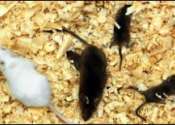Newly mapped genes may hold keys to ADHD
Millions of American kids with attention-deficit/hyperactivity disorder (ADHD) may have a genetic vulnerability to the disease, a new study suggests.
Nov 26, 2018
0
53
Millions of American kids with attention-deficit/hyperactivity disorder (ADHD) may have a genetic vulnerability to the disease, a new study suggests.
Nov 26, 2018
0
53

A father's exposure to nicotine may cause cognitive deficits in his children and even grandchildren, according to a study in mice publishing on October 16 in the open-access journal PLOS Biology by Pradeep Bhide of Florida ...
Oct 16, 2018
0
757

Hyperactivity seems to be the result of not being able to focus one's attention rather than the other way around. This was proposed in an article in PLOS ONE, written by researchers at Radboud university medical center and ...
Dec 2, 2016
2
70

Early exposure to nicotine can trigger widespread genetic changes that affect formation of connections between brain cells long after birth, a new Yale-led study has found. The finding helps explains why maternal smoking ...
May 30, 2016
1
203

Black-box warnings about the dangers of attention-deficit hyperactivity disorder (ADHD) medications are confusing and could have serious consequences for the risk of youth suicide, according to researchers at the Institut ...
Feb 1, 2016
2
57

Scientists have identified a gene that appears to play a significant role in raising a person's risk of having more severe subtypes of autism that co-occur with other genetic diseases, such as the chromosomal disorder 22q11.2 ...
Jan 19, 2016
0
301

You're driving on a busy road and you intend to switch lanes when you suddenly realize that there's a car in your blind spot. You have to put a stop to your lane change—and quickly.
Aug 26, 2015
0
168

Your attention, please. People make mistakes every day because they lose focus. Maybe your car drifts across the center line or an error slips into a report at work.
Feb 11, 2015
2
77

Whether you're taking a test or walking your dog across a busy street, your ability to tune out irrelevant sights and sounds in the environment—or your openness to detecting potential dangers—is crucial for success and ...
Feb 4, 2015
0
53

A darting mouse may hold an important clue in the development of Attention Deficit Hyperactivity Disorder (ADHD), autism and bipolar disorder, according to a study by a Vanderbilt University-led research team recently published ...
Nov 10, 2014
0
0
